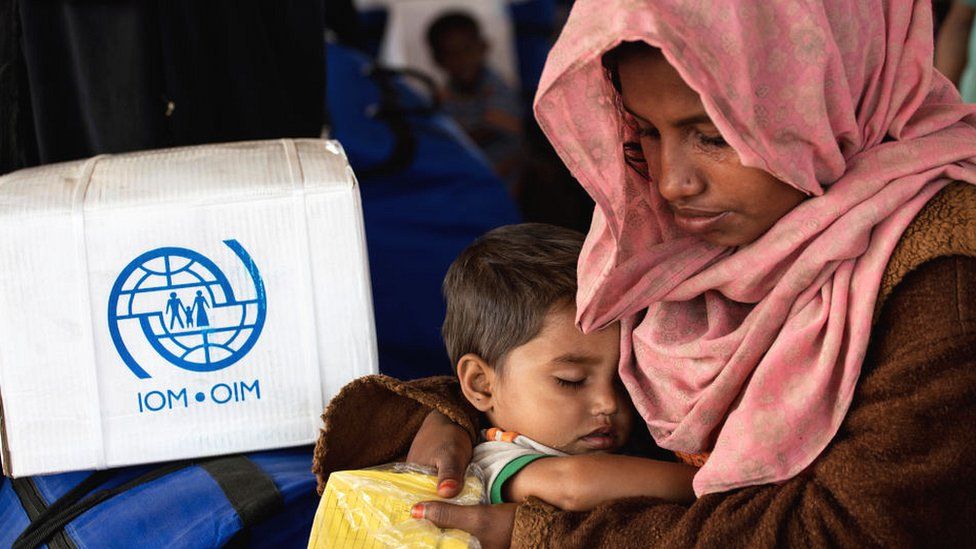Foreign aid: Who will be hit by the UK government cuts?
- Published

Chancellor Rishi Sunak has confirmed that the government's cut to foreign aid spending will continue until at least 2024.
The government reduced its annual aid budget from 0.7% of gross national income (GNI), which is a measure of the amount produced by the economy, to 0.5% this year. This represents a cut of between about £4bn and £5bn, depending on the size of the economy.
It breaks a pledge in the Conservative manifesto from 2019 and has led to warnings from aid agencies and opposition from MPs, including some Conservatives.
The government says the reduction is "temporary" and has set out conditions under which it would be reversed.
How much does the UK spend on aid?
Foreign aid had been increasing over the years, in line with a commitment to meet a target of spending 0.7% of GNI.
The promise to meet this UN-backed target was enshrined into law in 2015.
In 2020, foreign aid spending met the 0.7% target but fell in cash terms for the first time in about a decade. This was because the overall economy shrank.
What is the government's justification?
It says the 2015 legislation - which introduced the 0.7% target - refers to "fiscal circumstances" that governments may refer to, if they fail to meet it.
It says the pandemic has inflicted "immense" damage on the economy and cutting aid spending to 0.5% is a "difficult decision" to help restore the public finances.
It says it will return to 0.7% but only when the Office for Budget Responsibility (OBR) forecasts that:
- the government is not borrowing money for day-to-day spending
- underlying debt is falling as a percentage of national income
In the Autumn Budget and Spending Review, it was forecast that the economy would meet those conditions in 2024-25.
How does UK compare with other donors?
The government said in the Budget documents that UK remains a "development superpower and one of the largest... donors in the G7".
Before the cuts, it had the second highest contribution as a percentage of GNI of the G7 group, representing some of the world's leading economies.
Several other countries exceeded the UN aid target of 0.7% in 2020 - including Denmark (0.73%), Norway (1.11%) and Sweden (1.14%).
The UK's cut to its aid budget in 2021 is likely to take it below France, which has committed to a 0.7% contribution by 2025.
Where does foreign aid go?
UK aid funding supports hundreds of different projects around the world.
The bulk of spending in 2020 - more than 55% - was in the Africa region and used for bilateral aid.
Just under 39% was spent on bilateral aid for Asia, with much smaller amounts going to other parts of the world.
Bilateral aid is when the UK gives money to specific projects in individual countries, as opposed to giving it to international bodies such as the UN to spend as they see fit, which is called multilateral aid.
In recent years, most UK aid has been bilateral (roughly two-thirds), rather than multilateral.
Government figures for 2019 show that Pakistan was the top recipient that year of bilateral aid, followed by Ethiopia, Afghanistan, Yemen, Nigeria, Bangladesh and Syria.
Pakistan has received the most UK aid for some years now.
It has high levels of deprivation, with nearly a third of people living in poverty, and one in eleven children dying before they are five years old.
But it is also a nuclear-armed state with relatively high defence spending - more than 18% of government expenditure in 2019 was on the military, according to World Bank data.
What's the impact of the cuts?
In June, dozens of charities, non-governmental organisations (NGOs) and others submitted evidence to Parliament's international development committee, detailing the likely cuts they need to make.
The UN's family planning agency (UNFPA) looks set to lose some 85% of its UK funding for family planning, a drop of about £130m.
The UN's children's fund (Unicef) will see its funding reduced by about 60%
UNAIDS is also set to lose about 80% of its funding from the UK.
The charity Medecins Sans Frontieres said the cuts had affected key programmes, and were enacted "overnight" with no transition period or planning to mitigate their impact.
The World Health Organization's Global Polio Eradication Initiative will lose nearly all its UK funding, the body said in a statement.
The organisation says that UK funding will drop from £110m last year to just £5m this year.
There has also been concern that a technical widening of what counts towards the 0.5% could cause further damage.
A group of climate change advisers wrote to the government complaining about proposals to include Covid vaccine donations and complex currency handouts from the International Monetary Fund known as Special Drawing Rights (SDRs).
What's the impact in specific countries?
The International Rescue Committee (IRC) says its work in Syria has been severely impacted with up to 75% of the funding reduced from last year.
In Yemen, regarded as the world's worst humanitarian disaster, the UK's commitment to relief efforts for 2021 has gone down to £87.2m ($123.23m) from the £139.1m ($196.56m) that was pledged in 2020.
In Pakistan, according to the International Rescue Committee (IRC), the cuts will have an impact on education, and nearly 11,000 girls in rural Pakistan may not attend school if the funding stops.
In a letter accessed by the BBC, eight non-governmental organisations (NGOs) that provide humanitarian aid to Bangladesh's Rohingya refugees say UK funding of £321m has been cut by 42%.
In Nigeria, funding goes to projects on financial inclusion, food, education, health care, solar energy for schools and hospitals, electoral processes and civil society organisations.
Women for Women International - Nigeria says the UK has terminated a three-year grant agreement that was "halfway through" implementation.